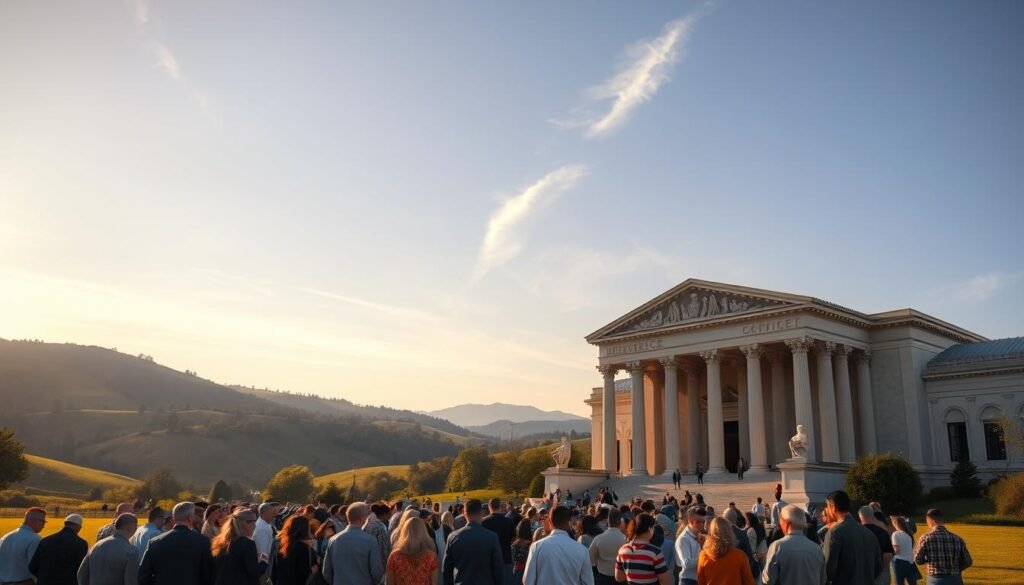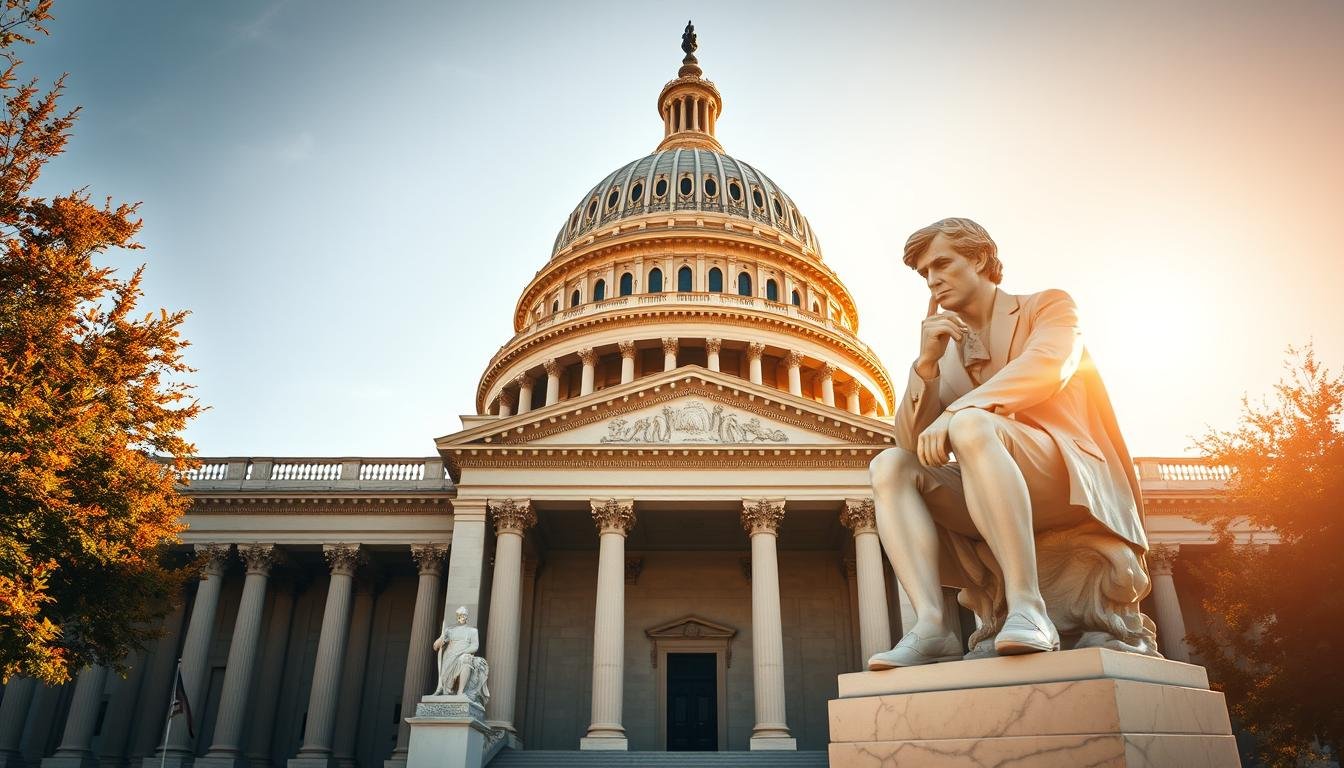Can a Naturalized Citizen Become President? When you look into who can be President, you might see the term “natural-born citizen.” But what does this mean for naturalized citizens who want to be President?
The US Constitution talks about who can run for President in Article II, Section 1. To figure out if a naturalized citizen can be President, you need to know the difference between natural-born and naturalized citizenship.
Knowing who can be President is key to understanding the role of naturalized citizens. Let’s look at what the Constitution says and what it means for those who got citizenship through naturalization.
Contents
- 1 The Constitutional Requirements for the Presidency
- 2 Understanding Different Types of Citizenship
- 3 What Does “Natural-Born Citizen” Mean?
- 4 Can a Naturalized Citizen Ever Become President?
- 5 Historical Context of the Natural-Born Citizen Requirement
- 6 Notable Naturalized Citizens Who Couldn’t Run for President
- 7 Attempts to Change the Natural-Born Citizen Requirement
- 8 Political Opportunities for Naturalized Citizens
- 9 Presidential Eligibility in Other Countries
- 10 Public Opinion and Future Outlook
- 11 Conclusion: Can a Naturalized Citizen Become President?
- 12 FAQ
- 12.1 What are the eligibility criteria for the presidency as outlined in the US Constitution?
- 12.2 What is the difference between a natural-born citizen and a naturalized citizen?
- 12.3 Can a person who is not born in the United States be considered a natural-born citizen?
- 12.4 Are there any exceptions to the natural-born citizen requirement for the presidency?
- 12.5 Can a naturalized citizen hold other elected offices in the United States?
- 12.6 How do other countries approach the issue of eligibility for their highest offices?
- 12.7 Have there been any attempts to change the natural-born citizen requirement?
- 12.8 What is the current public opinion on the natural-born citizen requirement?
The Constitutional Requirements for the Presidency
The US Constitution has clear rules for who can run for president. To qualify, a person must meet three main criteria. These are found in Article II, Section 1 of the Constitution.
These requirements are:
- Be a natural-born citizen of the United States.
- Be at least thirty-five years old.
- Be a resident of the United States for at least fourteen years.
Knowing these rules is key to figuring out who can be president. The rule about being a natural-born citizen is especially important. It has sparked a lot of debate.
The age rule makes sure the president is mature and experienced. The residency rule shows the president must have a strong tie to the country.
Historical Context
The Founding Fathers created these rules at the Constitutional Convention in 1787. They wanted a strong leader but also wanted to stop power abuse.
In short, the Constitution’s rules for the presidency are meant to prepare the president to lead well. By understanding these rules, you can see what qualities presidential candidates need.
Understanding Different Types of Citizenship
Ever wondered how you can get citizenship? There are two main ways: by birth or through naturalization. [Can a Naturalized Citizen Become President?]
Citizenship by birth, or jus soli, is given to those born in a country or to parents who are citizens. It’s automatic and based on the country’s laws.
Citizenship by naturalization is gained through a legal process. You need to meet certain requirements, like living in the country for a while. You also have to pass background checks and show you know the country’s language and history. The final step is taking an oath of allegiance, showing your commitment to the country.

It’s important to know the difference between natural-born citizens and naturalized citizens. Natural-born citizens get citizenship at birth, either by being born in the country or having citizen parents. Naturalized citizens, on the other hand, get citizenship after going through the naturalization process.
The difference between these types of citizenship matters a lot, especially when it comes to running for the presidency. As we dive deeper, understanding citizenship laws and their rules becomes even more crucial.
What Does “Natural-Born Citizen” Mean?
Ever wondered what “natural-born citizen” means and how it impacts presidential eligibility? This term isn’t clearly defined in the U.S. Constitution. This has led to many different views over the years.
Understanding citizenship is key to knowing who can be president. The Constitution sets out citizenship rules. But, the exact meaning of “natural-born citizen” has sparked a lot of debate.
Historical Interpretations and Legal Perspectives
The way we’ve seen “natural-born citizen” change over time is interesting. Some important points to think about are:
- The Constitution’s role in defining citizenship
- Legal precedents and court decisions
- Historical context and the founding fathers’ intentions
Legally, “natural-born citizen” is linked to the idea ofjus soli(right of the soil). This idea says you get citizenship if you’re born in the U.S. But, not everyone agrees on this, and legal experts have different opinions.
The ongoing debate about “natural-born citizen” shows how complexcitizenship requirementsandeligibility criteriafor the presidency are. It’s important to understand these ideas to fully grasp who can be president.
In short, “natural-born citizen” involves many historical, legal, and constitutional aspects. As you delve deeper into this topic, remember to consider all the different views and their effects on presidential eligibility.
Can a Naturalized Citizen Ever Become President?
As a naturalized citizen, you might wonder if you can be President. The US Constitution says the President must be a natural-born citizen. This means naturalized citizens can’t be President.
The difference between natural-born and naturalized citizens is key. A natural-born citizen is one born in the US or to US citizens abroad. A naturalized citizen gets citizenship through a legal process after birth.

This rule is important for naturalized citizens who want to be President. Even if they’ve made big contributions, their citizenship status keeps them out of the Oval Office.
| Citizenship Status | Eligibility for Presidency |
|---|---|
| Natural-Born Citizen | Eligible |
| Naturalized Citizen | Not Eligible |
Knowing these rules is crucial for naturalized citizens. They can vote and support candidates, but they can’t be President. The natural-born citizen rule blocks them from this office.
In conclusion, naturalized citizens are important in American society. But the Constitution’s rule makes them ineligible for the presidency. Changing this rule would need a constitutional amendment, a very hard process.
Historical Context of the Natural-Born Citizen Requirement
Did you know the natural-born citizen rule was added for a reason? It was included in Article II, Section 1 of the US Constitution in 1787. This was during the Constitutional Convention.
The founders were worried about foreign influence and wanted a president loyal to the US. They also feared monarchies and foreign allegiances. These concerns shaped the natural-born citizen rule.

Looking at the era’s events and figures helps us understand this rule better. Below is a table with key moments that influenced the natural-born citizen clause.
| Event | Year | Impact |
|---|---|---|
| Constitutional Convention | 1787 | Adoption of the natural-born citizen requirement |
| First Presidential Election | 1789 | George Washington’s unanimous election |
| Naturalization Act | 1790 | Established rules for naturalized citizenship |
Knowing this history helps us see why the natural-born citizen rule is important in American politics. [Can a Naturalized Citizen Become President?]
Notable Naturalized Citizens Who Couldn’t Run for President
Many naturalized citizens have greatly influenced America, but they can’t run for president. This is because of the “natural-born citizen” rule in the Constitution. These individuals have made big impacts, even though they can’t be president.
Arnold Schwarzenegger, former Governor of California, and Sergey Brin, Google co-founder, are examples. Schwarzenegger is known for bodybuilding, acting, and politics. Brin changed the tech world. But, they can’t run for president because they’re naturalized citizens.
Here are a few more examples of influential naturalized citizens:
- Albert Einstein, the famous physicist, who became a naturalized U.S. citizen in 1940.
- Madeleine Albright, the first female Secretary of State, who was born in Czechoslovakia and became a naturalized U.S. citizen.
- Indra Nooyi, the former CEO of PepsiCo, who is an Indian-American business executive.
These people have enriched American society with their work, leadership, and innovation. But, the Constitution’s rules keep them from being president.
Naturalized citizens have made big contributions, but the “natural-born citizen” rule stops them from being president. As the U.S. grows, it’s important to think about this rule’s impact on leadership and diversity.
Attempts to Change the Natural-Born Citizen Requirement
The US Constitution’s natural-born citizen clause has been debated since it started. Many have tried to change it over the years. [Can a Naturalized Citizen Become President?]
There have been many attempts to change the rule for who can be president. These efforts come from the growing diversity in the US and more naturalized citizens in politics.
- The need to reflect the changing demographics of the United States.
- The importance of allowing naturalized citizens to fully participate in the political process.
- The argument that the current requirement is discriminatory and outdated.
But, changing the rule is hard. The US Constitution is hard to change. It needs a lot of support from lawmakers and the public.
Challenges for those wanting to change the rule include:
- Overcoming the historical and constitutional significance of the current provision.
- Building a broad coalition of support among lawmakers, citizens, and other stakeholders.
- Addressing concerns about the potential implications of altering the requirement.
Changing the natural-born citizen requirement will likely keep being debated in American politics.
Political Opportunities for Naturalized Citizens
Even though you can’t be president, naturalized citizens have many ways to get involved in politics. You can join local councils or even federal legislative bodies.
As a naturalized citizen, you can run for important offices. For example, you can be in the U.S. House of Representatives. You just need to be 25 or older, a U.S. citizen for seven years, and live in the state you’re representing.
You can also be in the U.S. Senate if you meet certain requirements. The key eligibility criteria for the Senate are being at least 30 years old, a U.S. citizen for nine years, and living in the state you’re representing.
Additionally, naturalized citizens can hold state and local offices. This includes being a governor, state legislator, mayor, or city councilor. These roles let you shape policies that affect your community.
In short, while you can’t be president, naturalized citizens have many political chances. You can change American politics by running for these offices. [Can a Naturalized Citizen Become President?]
Presidential Eligibility in Other Countries
Looking at presidential eligibility in other countries can teach us a lot. It shows how different countries have their own rules for who can be president. These rules are not the same as the “natural-born citizen” rule in the United States.
In France, you can be president if you’re a French citizen and 18 or older. You don’t have to be born there. Germany also has its own rules. A candidate must be at least 40 and have German citizenship. But, you don’t have to be born in Germany.
| Country | Eligibility Criteria |
|---|---|
| France | French citizen, at least 18 years old |
| Germany | German citizenship, at least 40 years old |
| United Kingdom | British subject, meets specific residency requirements |
This comparison shows how different countries have their own rules for who can be president. By looking at these differences, we can understand more about how countries choose their leaders.
Public Opinion and Future Outlook
People have mixed feelings about a naturalized citizen becoming president. The debate over the natural-born citizen rule has heated up across the U.S.
Views on this topic vary widely. Some think the rule is key to the president’s loyalty and grasp of American values. Others see it as old-fashioned and unfair.
- Supporters of the rule worry about national security and the president’s role in representing America.
- Those against it stress the need for inclusivity and the valuable contributions of naturalized citizens to American society.
The future of this debate is unclear. As the U.S. becomes more diverse, there might be more support for changing or removing the natural-born citizen rule.
Conclusion: Can a Naturalized Citizen Become President?
You now know what it takes to be the President of the United States. A naturalized citizen, despite their big contributions, can’t be President because of the natural-born citizen rule.
The history and laws behind this rule show how complex presidential eligibility can be. As a naturalized citizen, you can still get involved in American politics, but there are limits.
It’s important to understand these details to really get American democracy. The ongoing debate about the natural-born citizen rule shows how American society and politics are always changing.
See Also: Are People with Down Syndrome Allowed to Vote?
FAQ
What are the eligibility criteria for the presidency as outlined in the US Constitution?
The US Constitution says a president must be a natural-born citizen of the United States. They must be at least thirty-five years old. And they must have lived in the United States for at least fourteen years.
What is the difference between a natural-born citizen and a naturalized citizen?
A natural-born citizen is a citizen from birth. A naturalized citizen becomes a citizen through a process. [Can a Naturalized Citizen Become President?]
Can a person who is not born in the United States be considered a natural-born citizen?
The term “natural-born citizen” is not clearly defined in the US Constitution. But it usually means someone is a citizen from birth. This can be by being born in the United States or abroad to US citizen parents.
Are there any exceptions to the natural-born citizen requirement for the presidency?
No, the natural-born citizen rule is a strict requirement for the presidency. It has been consistently interpreted this way. [Can a Naturalized Citizen Become President?]
Can a naturalized citizen hold other elected offices in the United States?
Yes, naturalized citizens can hold other elected offices. This includes federal and state offices. They just need to meet the specific eligibility criteria.
How do other countries approach the issue of eligibility for their highest offices?
Different countries have different rules for who can be their leader. Some look at age, residency, or citizenship. It varies a lot.
Have there been any attempts to change the natural-born citizen requirement?
Yes, there have been efforts to change the natural-born citizen rule. But these attempts have faced big challenges. They have not succeeded.
What is the current public opinion on the natural-born citizen requirement?
People have mixed opinions on the natural-born citizen rule. Some think it should stay the same. Others think it should change or be removed.

Hi, I am Tatum Bradford from Washington. I have a background in political science and work as a senior revenue officer. I love learning about U.S. presidents and sharing interesting facts about political history.

